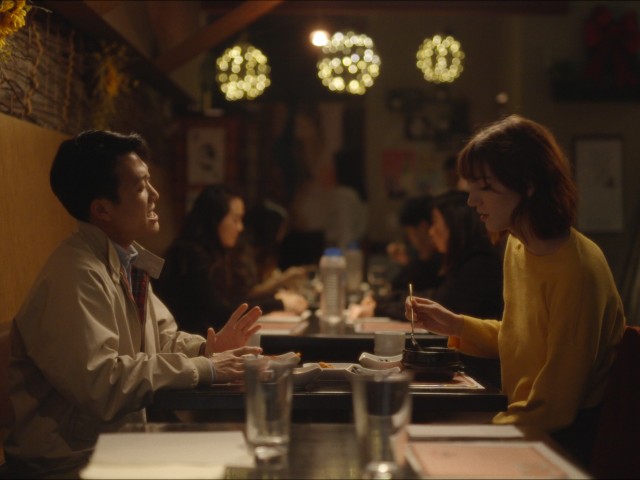In Neh, Jesse Gi tells the story of Billy, a Korean American man who must fake his way through a first date at a Korean restaurant by pretending he’s fluent in the language. The film tackles thorny emotions, examining the identity crises and insecurities felt by second-generation Americans through the kind of humor that will have you curling your toes.
Neh begins with Billy watching a Youtube video on how to count in Korean, stressed out because his cousin, who arranged the date, has exaggerated his cultural knowledge. Despite how irrational the situation seems, his commitment to the charade reflects his deep-seated insecurity about not being bilingual.
Joon Lee, a popular comedian (at least amongst the Asian American community), portrays Billy with a nervous yet captivating energy, marking a shift from the goofy persona he often embraces in his social media sketches. That’s not to say we don’t get to see his funny side; His comedic timing and delivery is especially great when Billy helplessly smiles and nods, relying on the only word he knows, “neh” (okay), even when it doesn’t make sense. Lee’s performances infuses Billy with sincerity, making his internal struggles both relatable and uncomfortably familiar for many.

Joon Lee as Billy (L) on his date with Carol (Katherine Smith-Rodden)
For many second-generation immigrants, the ability to read, speak, or write in their native language can be a sensitive issue, which is why it feels like a punch to the gut when the comments of Carol, Billy’s date, inadvertently reinforce that sense of shame. Though Billy’s bumbling efforts get him through most of the evening, the situation soon takes a dangerous turn when Carol realizes she forgot her epipen for her soy allergy – just as Billy, unaware, has ordered her a soybean soup. The complexities of interracial dating sets up a tense scenario, but the situation becomes even more nerve-wracking as Billy spirals, not only risking his own embarrassment but potentially putting Carol’s life in jeopardy.
Capturing a very specific kind of embarrassment – one that I’ve experienced countless times myself – Neh is a film that can perfectly be described as a cringe-comedy. As a date, I’d be horrified in that situation, but as a viewer, I can’t help but sympathize with Billy as he grapples with suppressed emotions and the weight of others’ judgment. In a desperate attempt to make things right, Billy confronts a harsh reality: the reason why so many second generation immigrants can’t speak their mother tongue is because we’re so focused on fitting in, that this often comes at the cost our cultural identity.
“I realized the pressures of my youth and trying to not be ‘different’ led me to dropping my native language.”
It is heartening to see a growing wave of films like Neh exploring Asian American identity, especially after years of limited representation. Director Gi, in discussing his inspiration for the film, explained that he wanted to start “digging into the reason why I stopped learning Korean and how I felt about that.” For Gi, his experiences at school and in his community were encouraging him to be less Asian and more white so with Neh, he wanted to express his confusion, regret, and acceptance of being a second-generation Korean-American.
“I hope to illuminate this conflict to those who may not inherently know, and to connect with those who do deeply connect with this struggle,” Gi concludes. To be multicultural in America often means living in discomfort, feeling like you belong to both cultures yet to neither at the same time. But with films like Neh, there’s a comforting reminder that you’re not alone in that struggle.

 Irina Wirjan
Irina Wirjan